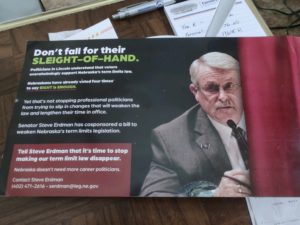NEBRASKA LEGISLATURE
The official site of the Nebraska Unicameral Legislature

Sen. Steve Erdman
District 47
The content of these pages is developed and maintained by, and is the sole responsibility of, the individual senator's office and may not reflect the views of the Nebraska Legislature. Questions and comments about the content should be directed to the senator's office at serdman@leg.ne.gov
February 3rd, 2023
By now many of you have received a postcard or two in the mail indicting me for trying to repeal term limits. Since these postcards went out in the mail, I have received numerous phone calls and emails about term limits. I deeply appreciate the phone calls and the emails I have received. I have been especially blessed by constituents who have sought me out to find out the truth about what this is all about, so today I would like to set the record straight about what the Legislature is trying to do regarding term limits.
The first thing I want you to know is that the postcards you have received in the mail are hit-pieces that are designed to smear my good name without knowing my position on the issue. The postcards accuse several state senators, including me, of committing a “slight of hand” maneuver to get rid of term limits for good. These were mailed out to residents living in 40 of Nebraska’s 49 legislative districts. Each postcard has a picture of the state senator representing that district along with his or her office phone number and email address. 40 legislative districts have been targeted because 40 State Senators co-signed a particular piece of legislation that the Virginia based group, Liberty Initiative, doesn’t like.
There is no “slight of hand” going on. “Slight of hand” suggests that these 40 state senators were trying to do something illegal, immoral or underhanded, and no such thing has occurred. The postcards sent out by the Liberty Initiative insinuate that the Unicameral Legislature somehow has the power to change term limits for state senators, and that simply is not the case. The reason that state senators cannot change their own term limits is because term limits are embedded in the Nebraska State Constitution, Article III, Section 12. Changing the Nebraska State Constitution always requires a vote of the people, and the Liberty Initiative conveniently left out that very important piece of information on their postcards.
So, what did I do? I, along with 39 other state senators, co-signed LR22CA. LR22CA is a resolution for a constitutional amendment to add a third consecutive term to a state senator’s tenure before he or she would become ineligible to run for the office again. LR22CA was introduced by Sen. Robert Dover of Norfolk, and if passed by the Legislature, would put an initiative on the 2024 ballot for the voters to decide. Again, it would be the voters who would decide this matter, not the Unicameral Legislature.
I co-signed LR22CA not because I agree with the bill itself; instead, I agree with a pending amendment to the bill. The pending amendment to LR22CA would limit a state senator to serving only three terms. In other words, three strikes and you’re out…for good. My position is that a state senator should be allowed to serve three consecutive terms and then never be allowed to ever run for the office again.
So, why the need for a third term? It has been the experience of many state senators, including me, that during the first term a state senator learns how to navigate the Unicameral Legislature. Freshman senators rarely ever get the opportunity to serve as committee chairs. During a second term, a state senator may get the opportunity to serve as a committee chair, but it often takes that senator four years to learn how to run the committee with excellence. A third term would allow a state senator who is a committee chair to run a committee with the kind of knowledge and skill that can only be acquired through legislative experience.
The State of Nebraska is a multi-billion-dollar operation. State senators are charged with the tasks of shaping tax policy, appropriating revenues, regulating banks, businesses and insurance companies, and legislating policies for recreation, conservation, natural resources, agriculture, healthcare, corrections, and several other facets of government which are too numerous to list here. Institutional knowledge becomes vitally important in a Unicameral Legislature where there is a high rate of turnover and where lobbyists and special interest groups are constantly trying to influence legislation.
Sen. Steve Erdman
P.O. Box 94604
Lincoln, NE 68509
(402) 471-2616
Email: serdman@leg.ne.gov
- Column (376)
- District Info (8)
- Events (6)
- Opinion (2)
- Press Releases (13)
- Uncategorized (4)
- Welcome (1)
-
Appropriations
Committee On Committees
Rules
Building Maintenance

Streaming video provided by Nebraska Public Media
